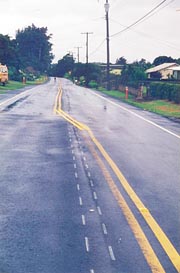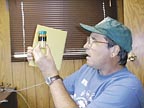A while back, I wrote that the drilling industry needs a school to help train drillers and bring the next generation up to speed. That piece caused me to get a lot of e-mail and quite a few phone calls. It seems I have missed or forgotten something.
Mr. Joe Jeauneau, an instructor at Southwest Mississippi State Junior College, informed me that at his school, there has been a two-year program for drillers in operation for years. He sent me a catalog and curriculum, and it looks like a good school. At present they have, if I remember right, 14 students presently enrolled. This is a good thing, and I'm going to give them all the help I can.
The problem: too many drillers don't take the time to attend the trade shows, join the associations or bother with continuing education. The way granddad did it seems good enough to them. This worked pretty well in the past, but this is, whether we like it or not, the 21st century, and if we don't all pull together, our industry doesn't have much of a future.
I ran into a driller the other day. This guy lives 30 or so miles away from me, and he said he'd never heard of me. This surprised me a little because I know most of the drillers within 100 or so miles, and plenty of other drillers worldwide. I asked him if he subscribed to National Driller. Nope. How about the other drilling magazine? Nope. Ever go to trade shows? Nope. Makes me wonder how he keeps up with the industry. I wonder if his rig is made of wood and is steam powered.

"Work" Update
In the "Our Tax Dollars Hard at Work" from last month's issue, I wrote about a state owned and operated rig drilling a piezometer well near me. I went by last week, and after about three months, they still weren't done with what would be a five-day job for private industry.Guess I'd better go out and hustle up a few more jobs -- at this rate, the taxes on my Social Security (if we still have it when I get there) will still be paying for this one well. As if that wasn't good enough, the state brought another rig into the area. Now they can drill twice as slowly! This might not be so bad if they would share their logs with the rest of us, but getting logs from the state is like pulling teeth. Believe me; I know. As I've said before, there is almost nothing government can do better than private industry, and government drilling is living proof. Why my tax money has to pay for a job I wasn't even asked to bid on is beyond my understanding.
Maybe next month I'll let you know if the state rig ever finished its hole, or if those guys simply are spending our money and making time.

"Dear Wayne"
From the "Advice to the Drillworn" department: I got a call from a driller who was having trouble with lost circulation in a loose sand formation. I've been over there in that area, and I know that the sand at 60-100 feet is so loose that you don't even have to rotate; you can just jet down through it. If you drill too fast, the sand will heave above the bit. Goodbye drill pipe. There are several strings of drill pipe in that area planted and growing roots.I told him to control his penetration rate, build good mud and keep it up. He said, "Oh, just use real heavy mud?" I explained that "heavy" mud was what was causing his problem, and we got into the old discussion about mud weight vs. mud viscosity. Since he didn't quite seem to grasp the picture, I went to his shop.
I hunted around and found some mason jars. I put about 2 inches of water in one, and about 2 inches of 140-weight gear oil in the other. I asked him which was heavier. He said the oil obviously was heavier. I slowly poured the oil into the water, and it floated on top. When he saw this, he understood that there is a big difference between weight and viscosity. The oil was thicker, but the water was heavier. High viscosity is what brings the cuttings out of the hole; weight is what holds back formation pressure. Confuse the two, and you're going to get the opportunity to buy a new string of drill pipe. Good, fresh mud is what builds wall cake, which holds the hole open long enough to run casing. You only can drill as fast as you can stabilize the hole. He went back to the rig Monday, mixed fresh mud and made a damn good well.
Report Abusive Comment